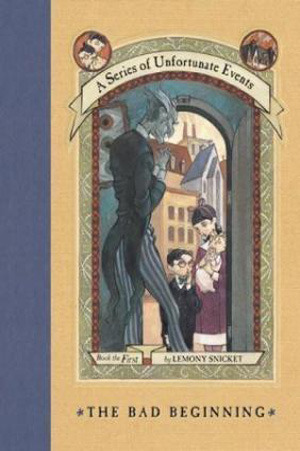
Fiction
176 pages
Dear Reader,
I'm sorry to say that the book you are holding in your hands is extremely unpleasant. It tells an unhappy tale about three very unlucky children. Even though they are charming and clever, the Baudelaire siblings lead lives filled with misery and woe. From the very first page of this book when the children are at the beach and receive terrible news, continuing on through the entire story, disaster lurks at their heels. One might say they are magnets for misfortune.
In this short book alone, the three youngsters encounter a greedy and repulsive villain, itchy clothing, a disastrous fire, a plot to steal their fortune, and cold porridge for breakfast.
It is my sad duty to write down these unpleasant tales, but there is nothing stopping you from putting this book down at once and reading something happy, if you prefer that sort of thing.
With all due respect,
Lemony Snicket
Completion: A
Writing/Style: D
Characters: C-
Plot/Pacing: B-
World-building/Atmosphere: C-
Sub-genres (Romance, Humor, Mystery, etc.): D-
Final Grade: C Library Rental
Disclaimer: For all those out there that have fond feelings toward this book, you all might want to turn away from this review now. I did not really care for it. At all. Proceed with caution.
Alas, I wish I could have liked this book more. I have only heard good things about this book and I hate to say that I couldn’t have been one of those people who loved it. I know many people love this series and are nostalgic to it, but I'm afraid I just could not see the appeal. The story was adequate and not too shabby. If you are able to suspend your disbelief, the mystery of Olaf’s scheme is actually pretty clever. However, the characters, especially the main three, relied more on stereotypes and quirks than anything else, which made it hard for me to become emotionally invested in them. As well bad things happen from start to end (as the title suggests), and yet they are made out to be mundane and even forewarned so I hardly blinked an eye when they happened. Evil people are evil for no reason, and we are to root for the main characters because, well, they are the main characters. Furthermore and most importantly, the narrator frequently uses higher leveled words and then explains what the words mean, which only serves as interrupting vocabulary lessons that stunt the story. For example:
“They purchased garlic, which is a sharp-tasting bulbous plant”.
“He saw Klaus sitting at the table and smirked, a word which here means ‘smiled in an unfriendly, phony way”.
“Violet Baudelaire, the eldest, liked to skip rocks. Like most fourteen-year-olds, she was right-handed…”
Having seen the movie, I must say that I believe this story would have benefited from being in a different medium like a graphic novel or cartoon, which would have allowed it more leeway in suspending disbelief. In its current state, I found it more than a bit lacking.
No comments:
Post a Comment